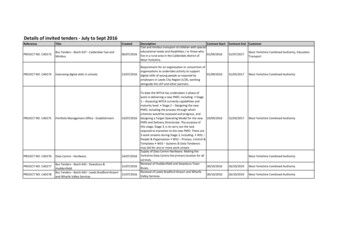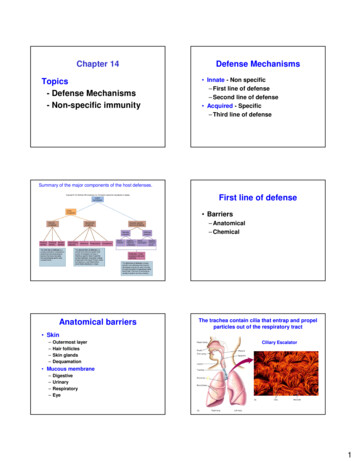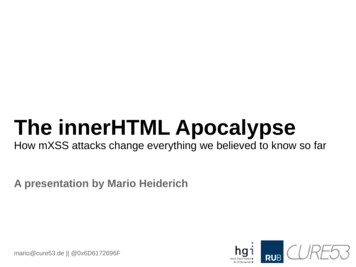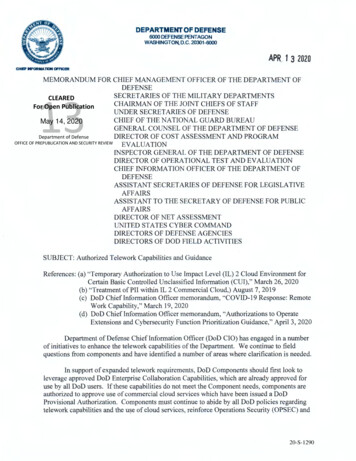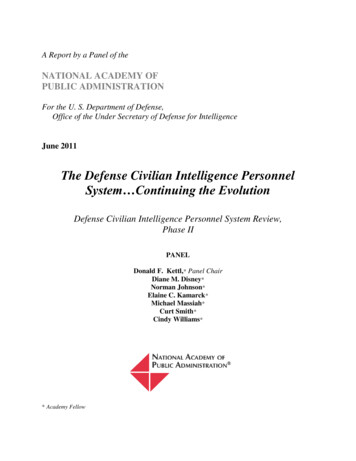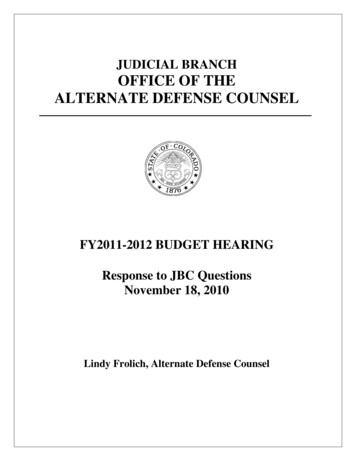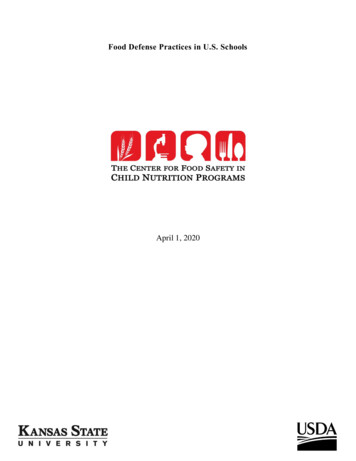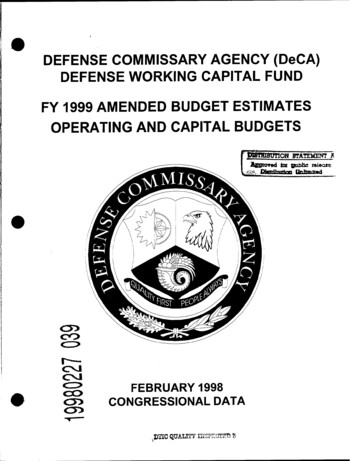
Transcription
Insurer Responses to Tenders ofDefense and the Consequences 2019 Jardine, Logan & O’Brien, P.L.L.P.8519 Eagle Point Boulevard, Suite 100 Lake Elmo, Minnesota 55042 651-290-6500 www.jlolaw.com
NOTICEThe reference materials contained in this guide have been abridged from a variety of sourcesand should not be construed as legal advice. Please consult legal counsel with any questionsconcerning this guide. 2019 Jardine, Logan & O’Brien, P.L.L.P.Insurer Responses to Tenders of Defense
Table of ContentsPageI.INTRODUCTION . 1II.IDENTIFY ALL POTENTIAL LIABILITY COVERAGES . 1III.AVOID PREJUDICE . 2IV.NOTICE . 3V.TENDER OF DEFENSE . 6VI.MILLER-SHUGART AGREEMENTS . 9VII.RESPONSE TO TENDER . 11VIII.RESERVATION OF RIGHTS . 13IX.COVERAGE FOR LESS THAN ALL OF THE CLAIMS . 14X.CONSEQUENCES FOR WRONGFUL DENIAL OF TENDER OF DEFENSE . 15XI.REIMBURSEMENT OF DEFENSE COSTS . 16XII.LOAN RECEIPT AGREEMENTS . 17XIII.TARGETED TENDER. 17XIV.CHOICE OF DEFENSE COUNSEL . 19XV.CONCLUSION . 19 2019 Jardine, Logan & O’Brien, P.L.L.P.Insurer Responses to Tenders of Defense
APPENDIX INDEXPageINSURANCE COVERAGE REFERENCE MATERIAL. A-1INSURED'S NOTICE TO INSURER . A-2INSURER'S RESPONSE TO NOTICE . A-3TENDER OF DEFENSE . A-4RESERVATION OF RIGHTS LETTER . A-5 2019 Jardine, Logan & O’Brien, P.L.L.P.Insurer Responses to Tenders of Defense
Insurer Responses to Tenders of DefenseI.IntroductionWhether a liability insurance policy affords coverage continues to spawn expensive andcomplicated litigation. The claims for coverage asserted on liability insurance policies often seemone step ahead of policy exclusions. In addition, environmental and toxic tort claims, frequentlyfrom quasi-administrative proceedings, are forcing insurers to reference old policies written decadesago to determine if liability coverage is owed years after the policies expired.II.Identify All Potential Liability CoveragesBefore there can be a contract dispute as to whether a given liability policy affords coverage for agiven claim, the insurance policy itself must have been in existence. In the overwhelming majorityof cases, it will be plainly evident whether a person has insurance coverage. However, there are agrowing number of toxic tort, state and federal remediation orders for soil and water contaminationand other unconventional "suits or claims" for "property damage," "bodily injury," and "personalinjury," creating more insurance coverage litigation. One treatise has underscored the problem bystating the following:[In] underlying delayed-manifestation toxic tort cases . . . policyholders need toknow about the existence, location, and terms of their policies in order to notify theappropriate insurance companies of underlying claims, to prove the existence ofpolicies and their terms if a coverage dispute later arises, or to assert a claim againstan insolvent insurance company. Insurance companies also need to know exactlywhat they sold their policyholders in order to prove the existence of any policyexclusions or limitations to coverage, to assess the availability of "other insurance"which may be applicable to potential claims, to provide notice to reinsurers, and toprepare for early documentation productions if a coverage dispute arises.Oshinsky, Jerold and Birnbaum, Sheila L. 1 Practitioner's Guide To LitigatingInsurance Coverage Actions: Commentary. Forms. § 1.01, pp. 1-3 (1996).The insured generally has the burden of establishing a prima facie case of coverage. See SCSCCorp. v. Allied Mut. Ins. Co., 536 N.W.2d 305, 311 (Minn. 1995) overruled on other grounds byBahr v. Boise Cascade Co., 766 N.W.2d 910 (Minn. 2009). "[T]he existence and contents ofmissing insurance policies [may be proved] by using secondary evidence . . . [such as] risk bulletinsand insurance coverage notes . . . evidence of payment of premiums, declaration sheet[s] andaffidavits from [a] company president and insurance agent . . . [all may prove] an existence of lostpolicies . . . [or] a certificate of insurance, cover letter from the broker indicating that the policy wasin effect, invoices indicating payment of premiums, and references to the missing policy and laterpolicies, along with the absence of evidence of withdrawal or cancellation of the policy," all may besufficient to prove the existence of lost or destroyed insurance policies. See Oshinsky, Jerold andBirnbaum, Sheila L. 1 Practitioner's Guide To Litigating Insurance Coverage Actions:Commentary. Forms. § 1.2, pp. 1-4 (1996). 2019 Jardine, Logan & O’Brien, P.L.L.PInsurer Responses to Tenders of Defense1
Once a prima facie case of liability insurance coverage is established, "the burden then shifts to theinsurer to prove the applicability of the exclusion as an affirmative defense." See SCSC Corp., 536N.W.2d at 313. The insurer can throw the burden of proof back to the insured with an exclusion."[O]nce the insurer shows the application of an exclusion clause, the burden of proof shifts back tothe insured because the exception to the exclusion 'restores' coverage for which the insured bearsthe burden of proof." Id. at 314.In other words, in Minnesota, the insured must plead and prove the existence of the liabilityinsurance policy. Once the insured has made out a prima facie case for liability insurance coverage,the burden shifts to the insurer to prove the "application of an exclusion" precluding coverage. Ifthe insurer proves application of that exclusion, the burden shifts back to the insured to prove thatthe liability claim against the insured is accepted from the application of that exclusion so thatinsurance coverage is "restored." Id.This burden of proof and shifting burdens of proof will never occur if the "insuring agreement" or"exclusions" cannot be proved. Hence, it is imperative for both the insured and the insurer toidentify all possible liability insurance coverage.III.Avoid PrejudiceA recurrent theme in insurance coverage litigation is whether one side or the other has beenprejudiced. See Gamble-Skogmo, Inc. v. St. Paul Mercury Indem. Co., 64 N.W.2d 380 (Minn.1954) overruled on other grounds by Woodrich Const. Co. v. Indem. Ins. Co. of N. Am., 89 N.W.2d412 (Minn. 1958); Faber v. Roelofs, 250 N.W.2d 817 (Minn. 1977); Iowa Nat. Mut. Ins. Co. v.Liberty Mut. Ins. Co., 464 N.W.2d 564 (Minn. Ct. App. 1990) review denied (March 15, 1991);Van Kampen v. Waseca Mut. Ins. Co., 754 N.W.2d 578 (Minn. Ct. App. 2008). Insurers frequentlyare required to prove actual prejudice before they will be relieved of their contractual duties todefend and/or indemnify. See Hooper v. Zurich Am. Ins. Co., 552 N.W.2d 31, (Minn. Ct. App.1996) review denied (Sept. 20, 1996). Conversely, insureds in the same instances will be presumedto be prejudiced. For example, if an insurer defends a liability claim without a reservation to denycoverage, the insurer will be estopped to deny coverage. The law is stated as follows:Prejudice is presumed because the insurer, by taking control of the defense without areservation of rights, takes away from the insured his right to control the defense ashe sees fit and to make or negotiate a settlement. Because the insurer has availableto him the simple procedure of giving a notice of reservation of rights to estop himfrom denying liability when he controls the defense without having given such anotice is not a harsh result. See Faber, 250 N.W.2d at 821.Simply put, the insurer must provide written notice of its intention to rely upon any policydefinition, limitation on liability or exclusion before it undertakes the defense of a case. The failureto interpose that reservation of rights may result in a waiver of those policy conditions. Id.In short, coverage cases turn on whether there is prejudice. In some cases, prejudice may bepresumed. Because prejudice may be presumed, it is very important that both the insured and theinsurer carefully handle notices of claims, tenders of defense, reservations of rights, declination 2019 Jardine, Logan & O’Brien, P.L.L.PInsurer Responses to Tenders of Defense2
letters, and other issues related to claims that are arguably with and without liability insurancecoverage.IV.NoticeNotice by the insured to an insurer of a possible claim is a routine condition in most commercialand personal liability policies. Sometimes the policy will state the type of notice (usually written)and how quickly it must be provided. One insurer has conditions which state as follows:Duties after Accident or LossWe have no duty to provide coverage under this policy if the failure to comply withthe following duties is prejudicial to us:A.We must be notified promptly of how, when and where the accident or losshappened. Notice should also include the names and addresses of anyinjured persons and of any witnesses.B.A person seeking any coverage must:1.Cooperate with us in the investigation, settlement, or defense of anyclaim or suit.2.Promptly send us copies of any notices or legal papers received inconnection with the accident or loss.3.Submit, as often as we reasonably require:a.b.4.Authorize us to obtain:a.b.5.C.D.To physical exams by physicians we select. We will pay forthese exams.To examination under oath and subscribe the same.Medical reports; andOther pertinent records.Submit a proof of loss when required by us.A person seeking Uninsured Motorist Coverage must also:1.Promptly notify the police if a hit-and-run driver is involved.2.Promptly send us copies of the legal papers if suit is brought.A person seeking Coverage for Damage to Your Auto must also: 2019 Jardine, Logan & O’Brien, P.L.L.PInsurer Responses to Tenders of Defense3
1.Take reasonable steps after loss to protect “your covered auto” or a“non-owned auto” and their equipment from further loss. We willpay reasonable expenses incurred to do this.2.Promptly notify the police if “your covered auto” or any “non-ownedauto” is stolen.3.Permit us to inspect and appraise the damaged property before itsrepair or disposal.Fire, Casualty and Surety Bulletins, Guide to Policies II, FW-11 (The NationalUnderwriter Co. 2005).Commercial policies also have notice provisions as conditions precedent under sections with titles,such as, "Duties in the Event of Occurrence, Offense, Claim or Suit." One insurer has conditionswhich state:Duties in the Event of Occurrence, Offense, Claim, or SuitA.B.C.You must see to it that we are notified as soon as practicable of an“occurrence” or another offense which may result in a claim. To the extentpossible, notice should include:1.How, when, and where the “occurrence” or event took place;2.The names and addresses of any injured persons and witnesses; and3.The nature and location of any injury or damage arising out of the“occurrence” or offense.If a claim is made or “suit” is brought against any insured, you must:1.Immediately record the specifics of the claim or “suit” and the datereceived; and2.Notify us as soon as practicable. You must see to it that we receivewritten notice of the claim or “suit” as soon as practicable.You and any other insured must:1.Immediately send us copies of any demands, notices, summonses orlegal papers received in connection with the claim or “suit”;2.Authorize us to obtain records and other information; 2019 Jardine, Logan & O’Brien, P.L.L.PInsurer Responses to Tenders of Defense4
D.3.Cooperate with us in the investigation or settlement of the claim ordefense against the “suit”; and4.Assist us, upon our request, in the enforcement of any right againstany person or organization which may be liable to the insuredbecause of injury or damage to which this insurance may also apply.No insured will, except at that insured’s cost, voluntarily make a payment,assume any obligation, or incur any expense, other than for first aid, withoutour consent.Fire, Casualty and Surety Bulletins, Guide To Policies I, FAU-11 (The NationalUnderwriter Co. 2007).Minnesota has liberally construed the notice requirements. See St. Paul Fire & Marine Ins. Co. v.Metro. Urology Clinic, P.A., 537 N.W.2d 297, 300 (Minn. Ct. App. 1995). A phone call providingan injured party's name and the possibility of a malpractice action may be sufficient to comply witha medical malpractice policy. Id. When the content of a notice is insufficient, an insurer who hasreceived some form of notice has the opportunity to further investigate the claim and obtain theinformation it needs. United Health Grp Inc. v. Columbia Cas. Co., 941 F.Supp.2d 1029 (D. Minn.2013). When the problem with the notice is that it did not reach the person or department specifiedin the policy, the insurer has no reason to suspect that the insured has made a claim and thereforehas no duty. Id.In a case where an insured was seeking coverage for remediation of soil and groundwatercontamination, a State agency's Request for Information to the insured accused of soil andgroundwater contamination constitutes a "suit" under comprehensive general liability policies. SeeSCSC Corp., 536 N.W.2d at 315. In SCSC Corp., the insured informed its insurer that it was subjectto claims by the State's Pollution Control Agency alleging property damage to the State's naturalresources. The insured asked the general liability insurer to indemnify it and provided the insurerwith relevant policy numbers and coverage periods during which the alleged property damage mayhave occurred. Id. at 316. The information provided by the insured in SCSC Corp. obligated thegeneral liability insurer to investigate the claims for coverage and to provide a coverage opinion.In a lengthy footnote in the SCSC Corp. decision, the Minnesota Supreme Court noted that, whenfaced with the information presented by the insured presenting an arguable claim for coverage, thegeneral liability insurer had a duty to investigate the claim for coverage or had an obligation todefend the insured. Id. at 316. In sum, the general liability insurer in SCSC Corp. failed to informthe insured of the general liability insurer's belief that the pollution exclusion applied, precludingcoverage to the insured, or the general liability insurer flatly failed to provide a definitive coverageposition. In either event, the general liability insurer's "silence," when presented with a "claim forarguable coverage under its policies," was wrong. It had a duty and obligation to tell its insured thatcoverage was excluded (under the pollution exclusion, for example) or it had a duty to state exactlywhat the general liability insurer's position was on the insured's claim for arguable coverage. Id. 2019 Jardine, Logan & O’Brien, P.L.L.PInsurer Responses to Tenders of Defense5
While a telephone call to an insurance broker advising the broker that there will be a possible claimmay have been sufficient under the Metropolitan Urology decision, the casual mention of a lawsuitto one's insurance agent is not a tender of defense and will not be sufficient notice under manycommercial policies. See Hooper v. Zurich-Am. Ins. Co., 552 N.W.2d at 37.Hooper was a manufacturer of sewer plugs. Its sewer plugs were very similar to a competitor's. Asa result, the competitor sued Hooper in state and federal court. Hooper had comprehensive generalliability (CGL) policies with Zurich American Insurance Company (Zurich) and Western NationalMutual Insurance Company (Western). Both the Zurich and Western CGL policies provided that"written notice" of an occurrence shall be given by the insured, as soon as practicable. See Hooper,552 N.W.2d at 33. In addition, both the Zurich and Western policies mandated that the lawsuitpapers be immediately forwarded to the insurer, as a tender of defense. Id.In Hooper, there was a casual mention to the insurance agent that Hooper had some lawsuits to dealwith and Hooper actually pointed to some papers on his desk as he mentioned the lawsuits to hisinsurance agent. Id. That casual mention was insufficient notice and was definitely not a tender ofdefense. The Minnesota Court of Appeals stated as follows:Where a policy mandates that an insured notify its insurance company of a lawsuit,the insured does not have the option of tendering defense by mentioning the lawsuitto a broker. See Hooper, 552 N.W.2d at 36.After the underlying cases were resolved, and after Hooper brought a legal malpractice lawsuitagainst the firm that unsuccessfully defended Hooper in the state and federal court actions, Hoopercommenced suit against Zurich and Western claiming insurance coverage. Id. at 34. The delay inmaking a claim on the policies, a suit by Hooper against Zurich and Western after the underlyingcases had been tried and settled, denied both Zurich and Western the opportunity to control thelitigation, to seek a declaratory judgment regarding coverage or to attempt settlement. Zurich andWestern were prejudiced. Id. at 36-7. Hence, because Hooper failed to comply with the notice andtender of defense requirements of the Zurich and Western policies, the trial court was correct indismissing Hooper's claims against the insurers.V.Tender of DefenseA strong argument may be made that as soon as a liability insurer receives notice from its insured ofa claim, the liability insurer must investigate the claim to determine whether it is arguably covered.The insured must only give the insurer notice of the claim and is not required to request a defense inorder to trigger the duty to defend. See Home Ins. Co. v. Nat’l. Union Fire Ins. of Pittsburg, 658N.W.2d 522, 532 (Minn. 2003). If arguably covered, the insurer must defend the claim, or state itsposition on coverage, reserves its rights to deny, or limit coverage, and then defend the claim. If theclaim is not covered, the insurer must provide that position to the insured. The liability insurermust promptly respond upon that initial notice. See SCSC Corp., 536 N.W.2d at 316. Thatnotwithstanding, where contractual indemnification is sought, a "tender of defense is a conditionprecedent to the creation of an obligation to indemnify." See Seifert v. Regents of Univ. of Minn.,505 N.W.2d 83, 87 (Minn. Ct .App. 1993), review denied (Oct. 28, 1993); Pedro Companies. v.Sentry Ins., 518 N.W.2d 49, 51 (Minn. Ct. App. 1994), citing St. Paul Fire & Marine Ins. Co. v. 2019 Jardine, Logan & O’Brien, P.L.L.PInsurer Responses to Tenders of Defense6
Estate of Hunt, 811 P.2d 432, 434-35 (Colo. App. 1991) (for the proposition that notice is acondition precedent to coverage where claims-made policy contains notification requirement). As amatter of simple fairness, an insurer cannot be required to investigate a claim until it receives noticeof that claim.The advice to an insured seeking coverage is simple. Give notice of the claim promptly, tender thedefense of the claim early and tender and retender often. While the duty to defend will be evaluatedat the time of the tender, if a claim is arguably within the liability coverage, the insurer mustinvestigate the claim and arguably owes defense from the time of the tender forward. The insurerwill likely be ordered to pay defense costs from the moment of the tender forward. See Pedro, 518N.W.2d at 52. If the initial notice and/or tender of defense are rejected, and more facts aredeveloped to bring the claim arguably within the liability coverage, a re-tender should be made. SeeIowa National, 464 N.W.2d at 568. Where the letter forwarding the lawsuit to the insurer statesthat "the enclosed information is not being sent as a claim," the insured is making a huge mistake.The notice or tender letter must be clear. It must explicitly state that a tender of defense is beingmade. See Towne Realty, Inc. v. Zurich Ins. Co., 548 N.W.2d 64, 65 (Wis. 1996).Where it is unclear that the insured is tendering its defense to the insurer, the Wisconsin SupremeCourt has held as follows:[I]f it is unclear or ambiguous whether the insured wishes the insurer to defend thesuit, it becomes the responsibility of the insurer to communicate with the insuredbefore the insurer unilaterally forgoes the defense. . . . [T]his holding should notcreate an onerous duty for insurers: a simple letter requesting clarification of theinsured's position should suffice. See Towne Realty, Inc., 548 N.W.2d at 67.The Wisconsin Supreme Court in Towne Realty further noted that "[t]he insurer fulfills its dutyonce it requests the insured for clarification of its position. If the insured is uncooperative orunresponsive, the insurer need not pursue the matter further. This will prevent a sophisticatedinsured from intentionally vacillating on whether it wants the insurance company to defend theaction and, then, after significant legal expenses have accumulated, demanding indemnification."Id. at 67. Obviously, if the insured explicitly states that it is waiving its contractual right to defenseand indemnity, the insurer has no obligation to the insured.If the insurer receives notice or tender of defense, does an investigation of the claims, rejects thetendered claims as not covered and its rejection is correct, it will owe nothing, neither defense norindemnification to the insured. See Wakefield Pork, Inc. v. Ram Mut. Ins. Co., 731 N.W.2d 154(Minn. Ct. App. 2007).The insured is well served by sending the notice and/or tender of defense letter early and byproviding enough information to place the claim arguably within coverage but no information thatwould provide a basis for denial of the tender. See Senger v. Minnesota Lawyers Mut. Ins. Co., 415N.W.2d 364, 367 (Minn. Ct. App. 1987). In Senger, the defendants tendered their defense to itsprofessional liability insurer and stated in their letter tendering the lawsuit that "this action arisesout of a business" owned by the insured lawyers and others. See Senger, 415 N.W.2d at 366-67.The admission in the tender letter, which forwarded the summons and complaint, that the suit arose 2019 Jardine, Logan & O’Brien, P.L.L.PInsurer Responses to Tenders of Defense7
from a business owned by one of the insureds, but not scheduled under the liability policy, was usedto deny defense and indemnification coverage. See Senger, 415 N.W.2d at 369. Hence, itbehooves an insured to make neither statements nor any admissions in the tender letter.Where the summons and complaint is arguably within coverage, the insured's tender letter shouldprovide more facts to bring the arguably covered claim within coverage or provide those factsexcepting the arguably covered claim from exclusion under the policy. In Senger, the MinnesotaCourt of Appeals stated, in part, as follows:When it is established by the insurer that the facts are such that there is no coverageunder the policy for any resulting liability, no duty to defend arises even if thecomplaint can be read to alleged set of facts which, if proved, would be withincoverage of the policy. See Senger, 415 N.W.2d at 369.On the other hand, if any claim on a complaint is arguably within the liability coverage, the insurerowes a duty to defend all the claims pled in the complaint. See Jostens, Inc. v. Mission Ins. Co.,387 N.W.2d 161, 165-166 (Minn. 1986). The insurer “who wishes to escape that duty has theburden of showing that all parts of the cause of action fall clearly outside the scope of coverage.”Id.It is in the insured’s best interests to tender defense as soon as possible. “[A]n insurer cannot beheld responsible for defense costs incurred prior to the tender of the defense request giving rise tothe insurer's duty to defend.” See Domtar, Inc. v. Niagara Fire Ins. Co., 563 N.W.2d 724, 739(Minn. 1997).An insurer's duty to defend is not, however, determined exclusively by the allegations in thecomplaint. See St. Paul Fire & Marine Ins. Co. v. Nat’l Computer Sys., Inc., 490 N.W.2d 626, 632(Minn. Ct. App. 1992). When the insurer is aware of facts outside the complaint that conclusivelyestablished that the acts giving rise to the claim are not covered under the policy, the insurer is notobligated to defend. Id. Denying the duty to defend, however, should be done cautiously because,if a duty to defend is subsequently found, the insurer will be obligated to pay the insured's litigationexpenses for forcing the insurer to assume that burden. See Meadowbrook, Inc. v. Tower Ins. Co.,Inc., 559 N.W.2d 411, 420 (Minn. 1997).For more than 100 years, Minnesota has held that a party may not collect attorney's fees absent acontractual agreement or statute granting a prevailing party a right to collect attorney's fees. SeeGarrick v. Northland Ins. Co., 469 N.W.2d 709, 714 (Minn. 1991). The sole exception to this ruleis found in coverage disputes between insurers and insureds. In American Standard Ins. Co. v. Le,the Minnesota Supreme Court held when an insured breaches a contractual duty to its insured, theinsured is “entitled to recover attorney fees incurred in maintaining or defending a declaratoryaction to determine the question of coverage.” 551 N.W.2d 923 (Minn. 1996). Attorney fees arerecoverable in a declaratory judgment action only if there is a breach of a contractual duty orstatutory authority exists to support such an award. Id. In essence, the Le decision stands for theproposition that, when an insurer breaches the insurance contract, it "is liable for the loss thatnaturally and proximately flows from the breach." See Olson v. Rugloski, 277 N.W.2d 385, 388(Minn. 1979). In order for an insured to recover over the policy limit it must show that the insurer 2019 Jardine, Logan & O’Brien, P.L.L.PInsurer Responses to Tenders of Defense8
breached the title insurance policy and that lost benefits were the natural and proximate breach.Mattson Ridge, LLC v. Clear Rock Title, LLP, 824 N.W.2d 622 (Minn. 2012).VI.Miller-Shugart AgreementsThe Minnesota Supreme Court has approved settlement agreements in which an insuredstipulates to a money judgment in favor of a plaintiff that releases the insured from personalliability, and the plaintiff agrees to seek coverage for the agreed upon amount from the insurer.Miller v. Shugart, 316 N.W.2d 729, 731 (Minn. 1982). These agreements, also referred to asMiller-Shugart agreements, are enforceable against an insurer if 1) the named insured is a partyto the agreement, 2) the insurer denied coverage, 3) the insurer was given notice of theagreement, and 4) the agreement is reasonable. Id.Miller-Shugart agreements arose out of an automobile accident in which a plaintiff was injured ina car owned by the insured and driven by a third party. The insured’s auto liability carrier deniedcoverage claiming that the driver was not an agent of the insured. Id. at 732. The court in thatcase held that although the insurer had never abandoned its duty to defend, the case presented adifficult situation in which the insured’s desire to extricate herself from personal liability must bebalanced by her duty to cooperate. The court stated that it would be unreasonable to expect aninsured to forgo a settlement that is in her best interest at a time when coverage under the policyis being questioned, exposing her to great personal liability. In a case in which the insurer deniescoverage, the insured is allowed to settle with the plaintiff, possibly binding the insurer, so longas the settlement is reasonable and free of collusion.In order for a Miller-Shugart agreement to be enforceable an insurer must 1) deny all coverage,and 2) be at risk of personal exposure for damages. Amer. Fam. Mut. Ins. Co. v. Donaldson, 820F.3d 374 (8th Cir. 2016). If these elements are met, an insured is allowed to breach itscooperation clause with its insurer. Id. Disputes over policy limits are not enough to show acomplete denial. If an insurer denies some claims but not all, courts have held a complete denialis lacking. Buysse v. Baumann-Furrie & Co., 448 N.W.2d 865 (Minn. 1989). A reservation ofrights does not mean complete denial is lacking as long as the reservation of rights reserves theright to challenge or deny all indemnity coverage. Id. at 873. If a reservation of rights is used andthe insurer provides counsel to the insured, the insurers counsel must sign off on any settlementfor it to be enforceable. Buysse v. Baumann-Furrie & Co., 481 N.W.2d 27, 29 (Minn. 1992). Thekey is abandonment. If an insurer aband
and insurance coverage notes . . . evidence of payment of premiums, declaration sheet[s] and affidavits from [a] company president and insurance agent . . . [all may prove] an existence of lost policies . . . [or] a certificate of insurance, cover letter from the broker indicating that the policy was
